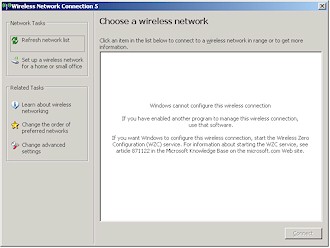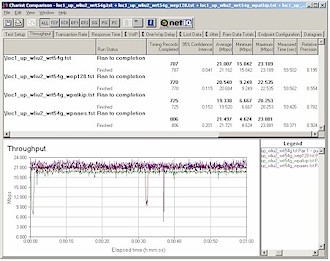The Pitch and Product
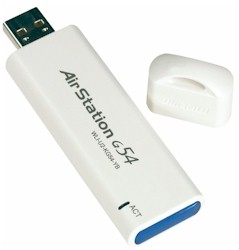
| BuffaloTech 54 Mbps Wireless USB 2.0 Keychain Adapter | |
|---|---|
| Summary | Flash-stick-style USB 2.0 802.11g client adapter that carries and installs its own driver and client manager application. Supports Buffalo’s AOSS auto-install system |
| Update | None |
| Pros | • Leave the install disk at home • Virtually no throughput hit with WEP or WPA |
| Cons | • Client Utility doesn’t cooperate with Zero Config • Installs on some Windows versions can be confusing |
Buffalo Technology’s WLI-U2-KG54-AI 54Mbps Wireless USB 2.0 Keychain Adapter distinguishes itself from the rest of the “keychain” or “USB flash-key” styled wireless adapters by being the first to automatically install its drivers and Client Utility when first connected to a Windows computer.
The AI is also the first Buffalo product to be based on a chipset from Taiwan-based RaLink, the RT2500USB to be exact. It’s also the second Buffalo 11g product to not use a chipset from Broadcom. (The first was the WLI-USB-G54 which converted from Broadcom to Conexant PRISM back in March [related story].)
Figure 1: The AI’s board
(click on the image for a larger view)
The AI’s white plastic package is about the size of a disposable butane lighter, but somewhat slimmer. It has a wireless activity (ACT) indicator that lights only during transmission, a tiny recessed switch to disable the auto-installation feature and a feature that should allow you to attach a lanyard or tiny keychain ring, neither of which is included. Buffalo does throw in a USB extender cable for use with hard-to-reach or too-closely-spaced USB ports.
To cut to the chase, I inserted the AI into a newly SP2-upgraded XP desktop machine and sat back to see what happened. The install was fairly uneventful, with the XP Notification Area / System Tray popping up two “Installed and Ready” notifications, one after the USB adapter install and the other after the wireless driver install.
The Product, Continued
The installation process for WinXP really is automatic, stopping only twice to ask permission: once to confirm start of the wireless driver install and a second time to see whether you want to install Buffalo’s Client Manager 2 application. Note that before the first confirmation request, however, the required files are uploaded from the AI’s flash memory to your computer’s hard drive while a small “in progress” window is displayed. This window doesn’t provide a clue as to the percent completion of the file load, which I would have liked to see.
Once the driver install starts, all dialog boxes that pop up are supplied with any required information and automatically confirmed. When the driver installation is completed you get a request to confirm installation of Buffalo’s Client Manager.
Installation on a old laptop running Win98SE was a little trickier. The installation process started when I plugged in the AI, but I had to dig out my Windows installation CD when Windows couldn’t find hidclass.sys while installing the USB driver. This was probably the first time I’d plugged something into the USB port since recently doing a fresh Win98 install, so most users probably wouldn’t encounter this problem.
The other head-scratcher was the MS-DOS window that came up early in the install and just sat there for somewhere between 10 and 30 seconds with only a cryptic C:windowstemp > debug > null entry. I thought the install had gone south, but fortunately I decided to hang in a little longer and was relieved when more text appeared in the DOS window, indicating the installation progress. Since Win98 doesn’t have the built-in wireless support included in WinXP, the Client Manager 2 installation automatically starts once the driver installs are done.
The Win98SE install appears to be done with a series of batch files that make for fascinating (ok, maybe just interesting) reading as they whiz by. Note that Buffalo’s single-page printed “Quick Setup Guide” covers only some aspects of a WinXP install, and the PDF User Guide on the included CD isn’t much more illuminating regarding the Win98 installation process.
I also tried the install on an XP SP1 laptop that had only a USB 1.1 port, which provided yet a different installation experience. Everything proceeded as in the XP SP2 install until the end of the wireless driver install. At that point I had a very confusing screen that displayed:
- The standard WinXP system notification balloon that you get when installing a USB2 adapter on a USB 1.1 machine
- A confirmation window that told me I had to reboot to complete the install
- A confirmation window for starting the Client Manager 2 install
My quandry as to where to click first was solved, however, when I accidently hit a key while trying to capture a screen shot of this networking newbie’s nightmare. Turned out that the reboot confirmation took precedence, blowing my screen capture. When the system rebooted, however, the Client Manager installation confirmation window came right up, so at least that worked out ok.
By the way, on each of the three machines that I installed the AI on, I tried uninstalling the adapter and cleaning out the obvious files that I could find in an attempt to force the auto-install process to start at the beginning. I wasn’t able to get any of the machines to restart the process from scratch, but I did succeed in messing up one of my XP machines enough to force me to do a System Restore (my bad, not Buffalo’s)! I don’t think the inability to repeat the install from scratch is really a problem for normal users. But it if it were, Buffalo provides the drivers and client utility on CD for installation the old-fashioned way.
The Product, Continued
I went ahead and installed Buffalo’s Client Manager 2 (CM2) mainly to see if had improved from the last time I looked at it, about a year ago. First, though, I just have to show you the CM2’s approach to software license acceptance.
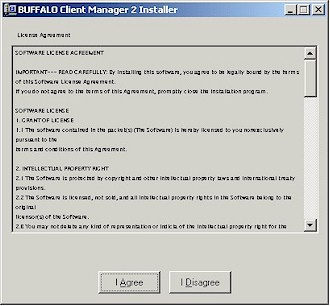
Figure 2: At last, an honest License Agreement confirmation!
Figure 2 (slightly reduced from actual size) shows that Buffalo gets the prize for the tiniest type in a software agreement confirmation window, bar none. But I also have to give them a prize (sorta) for not wasting effort on optimizing something that most of us gave up reading a long time ago!
Anyway, CM2 has acquired a new blue look (instead of the previous CM’s red color scheme), but I still found it somewhat clunky compared to other manufacturers’ client utilities.
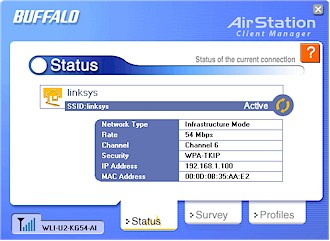
Figure 3: CM2 Status screen
The good news is that Buffalo has integrated a WPA supplicant into CM2 so that non-XP users can still take advantage of WPA’s improved security. The bad is that the interface has a number of quirks such as:
- The misleading coloring of the signal strength area that makes it look “grayed out”
- Lack of scanning-in-progress indication on the Survey tab
- Unnecessary drop-down selections on the Edit and Add buttons on the Profiles Tab
But its greater failings are its lack of controls for common network adapter properties such as transmit rate, power save mode and even adapter disable and lack of time-based plots of speed or signal strength, which are very helpful in doing site surveys.
If you still decide to use CM2 – which you’ll have to do in order to use Buffalo’s AOSS WLAN auto-setup feature – be warned that it lacks finesse when dealing with WinXP’s Wireless Zero Configuration. Once launched, it doesn’t ask for permission before not only stopping, but disabling the Zero Config service, nor does it tell you that what it’s done. CM2 also doesn’t enable and re-start ZeroConfig when you exit it.
I also found that WinXP SP2’s “improved” wireless capabilities weren’t as much help as they could be in recovering from CM2’s heavy-handed approach to dealing with Wireless Zero Config. Figure 4 shows the semi-helpful screen you’ll get when you attempt to view active networks after quitting CM2.
Figure 4: WinXP SP2’s not much help
(click on the image for a larger view)
Hard to believe that this is the best that the brain trust in Redmond could come up with, but I fault Buffalo just as much for not automatically interacting with Zero Config and not telling the user what it’s doing.
With this discovery behind me, I tried linking up with a Linksys WRT54G router with both CM2 and with Windows Zero Config. As quirky as CM2 might be, I found it much better than dealing with the “improved” wireless capabilities provided by XP SP2. The new wireless interface is so bad that I’m beginning to wonder whether Bill’s boys (and girls) are losing it, or just think they don’t have to care since millions of people will use whatever they come up with anyway.
At any rate, both methods got the job done whether I used no security, WEP or either flavor (TKIP or AES) of WPA-PSK. I didn’t try an AOSS connection, since I didn’t have a Buffalo AP or wireless router on hand, but had previously checked that feature on on Buffalo’s WBR2-G54.
My final complaint is that CM2 doesn’t automatically quit when the adapter is removed, even when I dutifully went through the “Safely Remove Hardware” process.
The Test
802.11g wireless performance test results are presented in the table below:
| Test Conditions:
– WEP encryption: DISABLED |
Firmware/Driver Versions:
AP f/w: |
|||
| Test Description |
Transfer Rate (Mbps) |
Response Time (msec) |
UDP stream |
|
| Throughput (kbps) |
Lost data (%) |
|||
|
Client to AP – |
21.2 |
1 (avg) |
500 |
0 % |
[Details of how we test can be found here.]
Since I don’t have a notebook with USB 2.0 interface, I had to skip my usual four location test and stay put for all my testing. So I concentrated instead on checking throughput for four security modes:
- No security
- WEP 128
- WPA-PSK TKIP
- WPA-PSK AES
Figure 5 shows that the RaLink chipset turns in very acceptable performance in all modes, with 21Mbps average throughput and only about 8% worst-case throughput degradation when using WPA TKIP. WPA AES actually had throughput faster than the no-security case, but I chalk this up to normal measurement variation and the built-in hardware encryption engine that the chipset has for supporting AES’ beefier computation requirements.
Figure 5: Security mode throughput comparison
(click on the image for a larger view)
Figure 5 also shows nice even throughput with a few “dropouts” that are not unusual for 11g adapters. This is my first experience with the RaLink chipset and I have to say I’m impressed, at least from these close-range results. Note that all these results are for uplink tests. I ran one downlink test that clocked in at 22Mbps average and 23.9Mbps max.
The Verdict
In an over-crowded marketplace, ya gotta have a gimmick to make your product stand out. And in the world of “keychain” or “flash key” style 802.11g USB 2.0 adapters, things are no different.
Buffalo’s product is the first time I’ve seen an adapter in any format that carries and auto-installs its own drivers. But depending on your needs or preferences, other differentiators such as the soft-AP feature in ZyXEL’s ZyAIR G-220, flexible connector approach taken by 3COM’s CRWE254G72 and IOGEAR’s GWU513, or flexible connector plus flip-up antenna feature offered by the Linksys WUSB54GP may be more attractive.
In the end, despite its little quirks, Buffalo’s WLI-U2-KG54-AI delivers what it promises. So if the idea of having a compact wireless adapter that can be kept in your pocket and installed on any Windows machine without having to carry driver installation disks with you strikes your fancy, then give it a shot.


